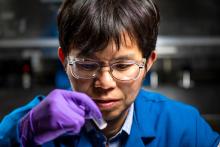Assembly of Molecular Memristors for Energy-Efficient Computing (AMMEC)


The Assembly of Molecular Memristors for Energy-Efficient Computing (AMMEC) project is working to develop the predictive understanding of polyoxometalate-peptoid-surface interactions needed to enable the codesign of transformative molecular memristors with controlled structure, chemistry, and long-range order for resilient and energy-efficient computing. Funded by the Department of Energy Office of Science, the project is developing the knowledge necessary for designing and fabricating highly energy-efficient artificial synapses for neuromorphic computing applications.

Grant Johnson Principal Investigator, Thrust 1 Lead
Grant E. Johnson is a scientist and the leader of the Chemical Physics and Separations team. He joined Pacific Northwest National Laboratory in 2010 as an inaugural Linus Pauling Distinguished Postdoctoral Fellow and was elected a Fellow of the American Society for the Advancement of Science in 2024. His research focuses on developing molecular metal oxides, known as polyoxometalates, for applications in energy storage, chemical separations, and computing. Johnson has contributed to the development of the ion soft landing technique that enables the controlled deposition of atomically-precise species onto surfaces suitable for detailed experimental characterization and theoretical modeling. These unique capabilities are being leveraged to understand how local interactions between polyoxometalates complexed with sequence-defined peptoids and surfaces determine their memristive states for neuromorphic computing applications.

Chun-Long Chen, Project Manager, Thrust 2 Lead
Chun-Long Chen is a chief scientist in the Physical and Computational Sciences Directorate at Pacific Northwest National Laboratory and an affiliate professor of chemical engineering and chemistry at the University of Washington. His research focuses on tackling the challenges of developing sequence-defined peptoids that mimic proteins and peptides for the assembly of biomimetic functional materials and for controlling inorganic crystal formation, aiming at the design and synthesis of bio-inspired functional materials that rival those found in biology.

Xiaogan Liang, Thrust 3 Lead
Xiaogan Liang is as a professor in the Mechanical Engineering Department of the University of Michigan. Liang was previously a staff scientist at The Molecular Foundry at Lawrence Berkeley National Laboratory. His current research interests are focused on nanoelectronics and optoelectronics based on low-dimensional nanostructures, nanomanufacturing systems, integrated biosensing systems, nanofluidic biosensors, and neuromorphic computing systems. Liang has received a National Science Foundation CAREER Award and is a member of multiple international engineering organizations.